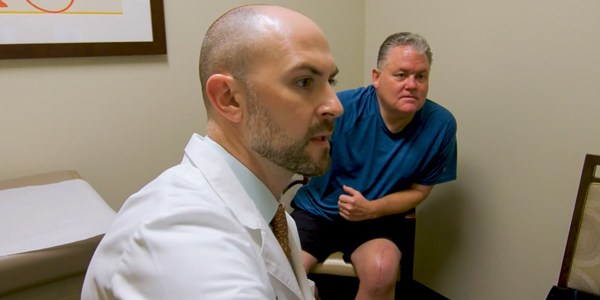Pro Bowler’s Knee Pain Threatens To Derail His Career
By Rona Gindin, Editorial Contributor
Jason Couch’s father ran bowling centers for a living, starting on the Gulf Coast and then in Central Florida. So it’s no surprise that Couch caught the bowling bug when he was only 4 years old.

After graduating from high school, Couch, now 52, began bowling professionally and even made history by winning the PBA Tournament of Champions three years in a row.
“It’s my entire life, honestly. I get to do what I want for a living, and I get to see parts of the world on somebody else’s dime,” Couch said.
Over time, his knees came to hurt constantly. By 2011, “I literally couldn’t walk without being in pain,” he said.
Plenty of 50-somethings have knee issues from decades of use, especially with repetitive actions. “You do the same motions over and over and over, your body’s going to break down,” Couch said.
He quit bowling in 2018. Now, thanks to two successful surgeries, Couch is looking to get back in the game. But his journey to get relief wasn’t easy.
Two Orlando-area surgeons dismissed Couch for being too young for knee surgery, but he found a third, at Orlando Health Jewett Orthopedic Institute. “The doctor looked at my X-ray and MRI and said, ‘Let’s get you some comfort.’”
That 2018 surgery on his right knee was a success, bringing much-needed pain relief. Within a few years, his left knee started hurting, and Couch knew he would need surgery on that one, too.
After a delay thanks to the pandemic, late last year Couch had his second surgery. It went even more smoothly than his 2018 procedure.
A robot made the difference. “The surgery took much less time,” Couch said. “The healing process took the same amount of time, but I was able to start physical therapy two or three days after I got home. I was back to bowling at four months both times.”
The new equipment gets credit for Couch’s ramped-up return to a pain-free life. “The technology has gotten so advanced, it’s amazing,” said Dr. Cody C. Green, the orthopedic surgeon who performed the recent surgery.
It’s my entire life. I get to do what I want for a living, and I get to see parts of the world on somebody else’s dime.– Jason Couch
“Jason had a partial knee replacement where you just replace one side of the knee,” explained Dr. Green, noting that using a robot leads to “the most natural-feeling replacement, as opposed to a total knee replacement.” The reason? “It keeps your natural ligaments, so the recovery is much quicker. And it’s much more functional from an early stage in your recovery.”
Couch, who lives in Clermont, got lucky. His local hospital, Orlando Health South Lake Hospital, has its outpatient rehabilitation in the Orlando Health National Training Center, which is the training home for many Olympians. All the best equipment and trained physical therapists can’t alleviate the pain involved, but Couch kept pushing.
“Do your physical therapy or the road to recovery will be much longer,” he said. “I know people who had the same surgery and kind of gave up because physical therapy was too hard. It took them a year at least to get where they felt normal again.”
This summer, the seasoned sportsman will start traveling with the PBA50 Tour, which means the summer away from him his family. He and his wife, Kim, have two teenage children together, and Couch has two adult children. They will all be cheering him on throughout the tour.
Couch credits Dr. Green, the robot and all the Orlando Health team members who helped along the way with his successful return to bowling.
“There is no doubt in my mind that I went to the best healthcare system in the country,” Couch said. “I know that Orlando Health Jewett Orthopedic Institute will also do the best for you. Dr. Green is definitely looking out for me. The rest of the staff is absolutely fantastic, too.”




